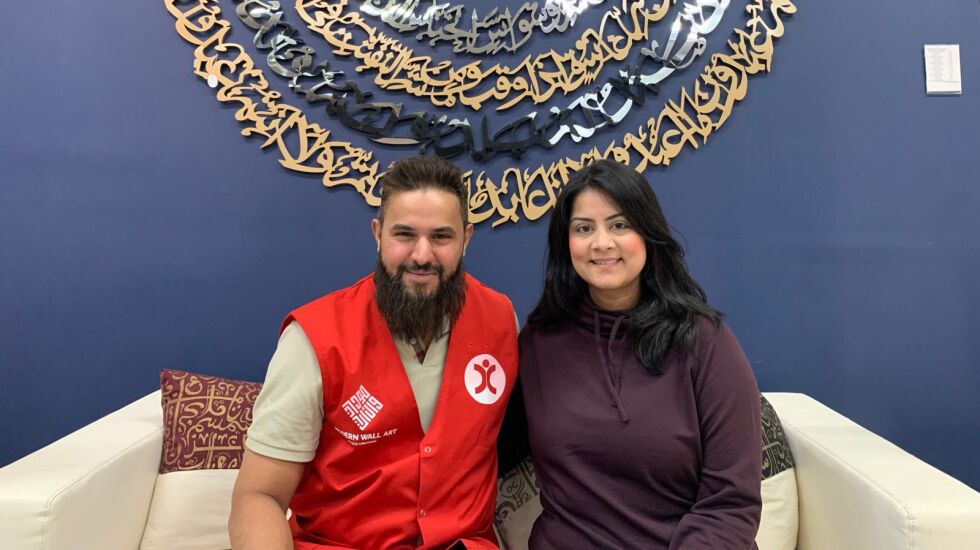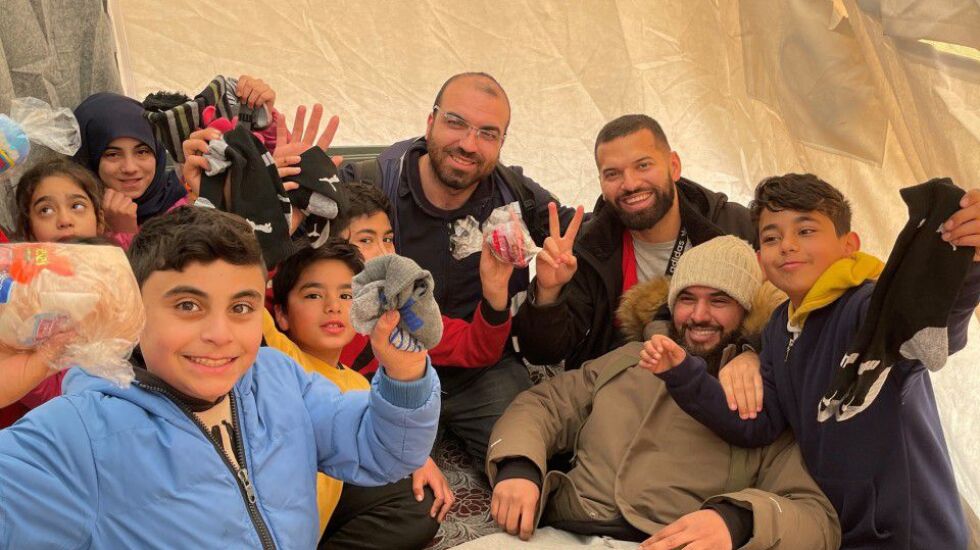
Since 2014, artist and philanthropist Syed Rahman, who owns galleries in Bridgeview and Skokie, has created stainless steel art and furniture featuring Islamic designs.
In times of international crisis over the last decade, Rahman, 39, has used his social media following to drum up donations for charities in Palestine, Afghanistan and Morocco.
Rahman — who was born in India and raised in Saudi Arabia — recently flew to Turkey, where, with volunteers from the Canadian nonprofit Human Concern International, he helped deliver food to victims of the catastrophic Feb. 6 earthquake.
In an interview edited for brevity and clarity, he spoke about his life, why he organized that trip and what he observed.
Finding his artistic calling
We came to America around 2001. My dad was in the U.S. Army in Saudi Arabia because of the Gulf War. And then, when the war was over, they asked my dad if he wanted to come to America.
My education is all in health care. Art was just a passion on the side. So the first piece of art I made was when I bought my house in 2005. I made it very nice and modern, but I couldn’t find modern Islamic calligraphy to go with it.
That’s when I was, like, “What if I do something that matches my stainless steel appliances?”
So I made that art — it said “God bless our home” in Arabic — for my own house and with no intentions to sell it. But then people asked, “Where’d you get that from? Can you make me one?”
What I specialize in is I take the Quranic verses, and I do calligraphy of them. When I got married in 2012, my wife told me to make a Facebook page to cater to a wider audience. That page we made went viral. Within a week, we got 1,000 followers.
Why he got into charity work
The first time we started the charity work was around 2014. It was for a Syrian refugee camp in Greece, and I collected $8,000 at that time. That was my cousin just going to the refugee camp [to supply food, water, necessities]. He wasn’t working with an organization at all. After that, I was just doing something by myself. Now, I have a 501c3, the Muslim Welfare Association.
It’s all because of my dad. Ever since we were young, he’s been helping out people. I remember our living room used to be always full of people. Because my dad spoke Arabic, and [they] were foreigners, my dad would help them get their visas. He used to do it the hard way because it was door-knocking back then. There was no internet.
When I started building followers with Modern Wall Art, I decided, instead of just donating money myself, that I would get my followers involved, too.
It’s my third year working with Human Concern International. They have a team in Turkey and Syria. They were the ones that were willing to work with me the way I wanted because, when I do this charity work, I’m very strict.
When I went to Turkey, I was on their case, like: “I need to see what’s happening in Syria right now. So can you produce me the results? Can you show me pictures?”
And they did. I know if someone doesn’t like my art, they can return it and get a refund. But charity is a one-way street. It’s all based on trust, and I don’t want to lose that trust.
Deciding to go to Turkey
This happened literally overnight. The earthquake hit February 6/ We booked the flight February 7 and flew out the 8th.
[The brand ambassador from Human Concern International who was going on the trip] flew out from Canada, and I flew from Chicago. We met in Turkey, and he was my guide pretty much. Otherwise, I would have been lost. We flew from Istanbul to Gaziantep and then to Islahiya.
It felt like a war zone. All the buildings had collapsed. There were rescue teams and ambulances everywhere. Everyone’s displaced. The rich and the poor, they’re out on the street.
Even if the buildings didn’t fall, you have to evacuate. So everyone’s out on the street. They’re living in their cars.
People in Gaziantep have money. You’ll see nice BMWs or Mercedes, and they’re sleeping in them. These people ended up in tents. There were probably 6,000 people in each location. All the houses are empty because the government now has to go and inspect your building and put a green sticker for you to go back in.
Even the mosque where we were staying, they told us to evacuate. There were 200 families staying there. There were more kids than adults — I wasn’t expecting that. In the mosque, it would be a playground. A lot of these kids don’t even know what happened to them. They were having fun.
But the parents were the ones that were struggling because there was one washroom, and it was outside the mosque, and it’s very, very cold. I thought Chicago was cold until I went there. They don’t have warm water, so I was washing my face with ice-cold water. Men, women and kids, we’re using the same washroom, so the sanitation was really bad. People have been wearing the same clothes for five days.
They need to change. They need diapers. We didn’t have blankets. Wwe’re sleeping on the ground. It was a very humbling trip for me.
How he helped
I had a person come to me, and he told me his mom had Parkinson’s, and they were running out of medication. There are no pharmacies open. What can I do? So we got a volunteer who said: I can get you in a pharmacy, and I can get you the medication.
The kitchens were one floor only. I would assume the buildings were for, maybe, nursing homes or something where you could cook in bulk because the stoves were huge. These kitchens were producing mountains of bread and selling the meals [including in bulk to relief organizations such as Human Concern International]. We’ll buy, like, 100 meals, and HCI distributes them.
Food aid is what I’m mostly interested in: giving food packages to people who are displaced. The food was very basic. Breakfast would be soup and bread. Lunch would be rice and chicken. It’s just enough for survival.
Social media’s role
I felt like if I go and show people what I’m doing, it would raise more funds, and it would help more people.
We are at $390,000 right now. That doesn’t include the $20,000 that I gave,. So I would say about $410,000. We donated [the $20,000] to a different organization, [the Chicago nonprofit] Islamic Oasis. They’re local, and they focus on medical [care].
I’m a business doing charity on the side, but people are looking at me as a charity, doing business on the side.
I was a day late posting about Turkey because I was still working with HCI. During that day, my DMs were full with people, like, “Where’s your campaign?”

What motivates him
My 5-year-old daughter was my motivation to go to Turkey. When she went to school, they were teaching about the earthquakes and explaining how there’s so much damage. She told my wife, “Abu [Dad] needs to go help them.” Then, she gave me her toy Scooby-Doo and said, “Give this to someone.”
So I was, like, “Man, this is my opportunity to set an example for her.”
We didn’t just give that Scooby-Doo. We went out to a Dollar Store, bought 60 stuffed animals and made goodie bags. We gave those out in the tents as well.







